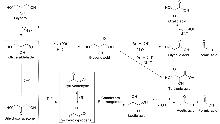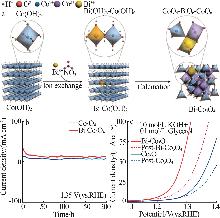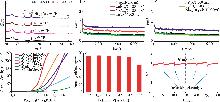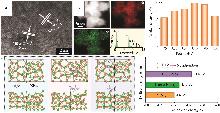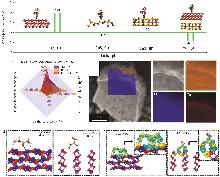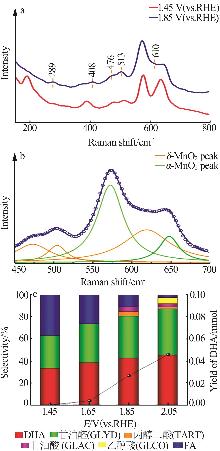Inorganic Chemicals Industry ›› 2025, Vol. 57 ›› Issue (4): 1-10.doi: 10.19964/j.issn.1006-4990.2024-0412
• Reviews and Special Topics • Next Articles
Research progress of non-noble metal-based catalysts for electrooxidation of glycerol
BAI Yitong( ), SONG Mingyang, LI Jiefei(
), SONG Mingyang, LI Jiefei( )
)
- School of Petrochemical Engineering,Shenyang University of Technology,Liaoyang 111003,China
-
Received:2024-07-19Online:2025-04-10Published:2024-08-28 -
Contact:LI Jiefei E-mail:15042499795@163.com;lijf@sut.edu.cn
CLC Number:
Cite this article
BAI Yitong, SONG Mingyang, LI Jiefei. Research progress of non-noble metal-based catalysts for electrooxidation of glycerol[J]. Inorganic Chemicals Industry, 2025, 57(4): 1-10.
share this article
| [1] | AMBAT I, SRIVASTAVA V, SILLANPÄÄ M.Recent advancement in biodiesel production methodologies using various feedstock:A review[J].Renewable and Sustainable Energy Reviews,2018,90:356-369. |
| [2] | BUDŽAKI S, MILJIĆ G, TIŠMA M,et al.Is there a future for enzymatic biodiesel industrial production in microreactors?[J].Applied Energy,2017,201:124-134. |
| [3] | ALMENA A, BUENO L, DÍEZ M,et al.Integrated biodiesel facilities:Review of glycerol-based production of fuels and chemicals[J].Clean Technologies and Environmental Policy,2018,20(7):1639-1661. |
| [4] | LI Jiefei, LI Zhenyu, ZHENG Zexuan,et al.Tuning the product selectivity toward the high yield of glyceric acid in Pt-CeO2/CNT electrocatalyzed oxidation of glycerol[J].ChemCatChem,2022,14(16):e202200509. |
| [5] | ZHANG Xueqiong, ZHOU Dan, WANG Xiaojing,et al.Overcoming the deactivation of Pt/CNT by introducing CeO2 for selective base-free glycerol-to-glyceric acid oxidation[J].ACS Catalysis,2020,10(6):3832-3837. |
| [6] | GUSCHAKOWSKI M, SCHRÖDER U.Direct and indirect electrooxidation of glycerol to value-added products[J].ChemSusChem,2021,14(23):5216-5225. |
| [7] | SKRZYŃSKA E, WONDOŁOWSKA-GRABOWSKA A, CAPRON M,et al.Crude glycerol as a raw material for the liquid phase oxidation reaction[J].Applied Catalysis A:General,2014,482:245- 257. |
| [8] | AN Zhe, MA Honghao, HAN Hongbo,et al.Insights into the multiple synergies of supports in the selective oxidation of glycerol to dihydroxyacetone:Layered double hydroxide supported Au[J].ACS Catalysis,2020,10(21):12437-12453. |
| [9] | LI Jiefei, JIANG Kunhong, BAI Suohong,et al.High productivity of tartronate from electrocatalytic oxidation of high concentration glycerol through facilitating the intermediate conversion[J].Applied Catalysis B:Environmental,2022,317:121784. |
| [10] | KIM D, OH L S, TAN Yingchuan,et al.Enhancing glycerol conversion and selectivity toward glycolic acid via precise nanostructuring of electrocatalysts[J].ACS Catalysis,2021,11(24):14926-14931. |
| [11] | TEREKHINA I, WHITE J, CORNELL A,et al.Electrocatalytic oxidation of glycerol to value-added compounds on Pd nanocrystals[J].ACS Applied Nano Materials,2023,6(13):11211-11220. |
| [12] | YANG Tianpei, SHEN Yi.Coupling glycerol conversion with hydrogen production using alloyed electrocatalysts[J].Langmuir,2023,39(36):12855-12864. |
| [13] | KATRYNIOK B, KIMURA H, SKRZYŃSKA E,et al.Selective catalytic oxidation of glycerol:Perspectives for high value chemicals[J].Green Chemistry,2011,13(8):1960-1979. |
| [14] | MORALES D M, JAMBREC D, KAZAKOVA M A,et al.Electrocatalytic conversion of glycerol to oxalate on Ni oxide nanoparti-cles-modified oxidized multiwalled carbon nanotubes[J].ACS Catalysis,2022,12(2):982-992. |
| [15] | HAN Xiaotong, SHENG Hongyuan, YU Chang,et al.Electrocatalytic oxidation of glycerol to formic acid by CuCo2O4 spinel oxide nanostructure catalysts[J].ACS Catalysis,2020,10(12):6741-6752. |
| [16] | VO T G, HO P Y, CHIANG C Y.Operando mechanistic studies of selective oxidation of glycerol to dihydroxyacetone over amorphous cobalt oxide[J].Applied Catalysis B:Environmental,2022,300:120723. |
| [17] | HUANG Xin, ZOU Yu, JIANG Jiang.Electrochemical oxidation of glycerol to dihydroxyacetone in borate buffer:Enhancing activity and selectivity by borate-polyol coordination chemistry[J].ACS Sustainable Chemistry & Engineering,2021,9(43):14470-14479. |
| [18] | ZHANG Jiali, SHEN Yi, LI Hongying.Electrolysis of glycerol by non-noble metal hydroxides and oxides[J].ACS Applied Energy Materials,2023,6(10):5508-5518. |
| [19] | XIA Zhongcheng, MA Chongyang, FAN Yun,et al.Vacancy optimized coordination on nickel oxide for selective electrocatalytic oxidation of glycerol[J].ACS Catalysis,2024,14(3):1930-1938. |
| [20] | WU Liyun, WU Qilong, HAN Yun,et al.Strengthening the synergy between oxygen vacancies in electrocatalysts for efficient glycerol electrooxidation[J].Advanced Materials,2024,36(26):e2401857. |
| [21] | DAI Chencheng, SUN Libo, LIAO Hanbin,et al.Electrochemical production of lactic acid from glycerol oxidation catalyzed by AuPt nanoparticles[J].Journal of Catalysis,2017,356:14-21. |
| [22] | PURUSHOTHAMAN R K P, VAN HAVEREN J, VAN ES D S,et al.An efficient one pot conversion of glycerol to lactic acid using bimetallic gold-platinum catalysts on a nanocrystalline CeO2 support[J].Applied Catalysis B:Environmental,2014,147:92- 100. |
| [23] | ZHANG Chen, WANG Tao, LIU Xiao,et al.Selective oxidation of glycerol to lactic acid over activated carbon supported Pt catalyst in alkaline solution[J].Chinese Journal of Catalysis,2016,37(4):502-509. |
| [24] | LAM C H, BLOOMFIELD A J, ANASTAS P T.A switchable route to valuable commodity chemicals from glycerol via electrocatalytic oxidation with an earth abundant metal oxidation catalyst[J].Green Chemistry,2017,19(8):1958-1968. |
| [25] | ZHANG An, LIANG Yongxiang, ZHANG Han,et al.Doping regulation in transition metal compounds for electrocatalysis[J].Chemical Society Reviews,2021,50(17):9817-9844. |
| [26] | HOUACHE M S E, HUGHES K, SAFARI R,et al.Modification of nickel surfaces by bismuth:Effect on electrochemical activity and selectivity toward glycerol[J].ACS Applied Materials & Interfaces,2020,12(13):15095-15107. |
| [27] | WANG Yeli, ZHU Yuquan, XIE Zhiheng,et al.Efficient electrocatalytic oxidation of glycerol via promoted OH* generation over single-atom-bismuth-doped spinel Co3O4 [J].ACS Catalysis,2022,12(19):12432-12443. |
| [28] | LUO Wenshu, TIAN Han, LI Qin,et al.Controllable electron distribution reconstruction of spinel NiCo2O4 boosting glycerol oxidation at elevated current density[J].Advanced Functional Materials,2024,34(3):2306995. |
| [29] | XU You, LIU Tiantian, SHI Keke,et al.Iridium-incorporated Co3O4 with lattice expansion for energy-efficient green hydrogen production coupled with glycerol valorization[J].Chemical Communications,2023,59(13):1817-1820. |
| [30] | 王烨,葛瑞翔,刘翔,等.一种阴离子浸出策略合成金属羟基氧化物用于电催化甘油氧化[J].物理化学学报,2024,40(7):43-46. |
| WANG Ye, GE Ruixiang, LIU Xiang,et al.An anion leaching strategy towards metal oxyhydroxides synthesis for electrocatalytic oxidation of glycerol[J].Acta Physico-Chimica Sinica,2024,40(7):43-46. | |
| [31] | GOETZ M K, USMAN E, CHOI K S.Understanding and suppressing C-C cleavage during glycerol oxidation for C3 chemical production[J].ACS Catalysis,2023,13(24):15758-15769. |
| [32] | WAN Haibo, DAI Chencheng, JIN Liujun,et al.Electro-oxidation of glycerol to high-value-added C1-C3 products by iron-substituted spinel zinc cobalt oxides[J].ACS Applied Materials & Interfaces,2022,14(12):14293-14301. |
| [33] | ZHONG Zhiyang, LI Menglu, WANG Jiaojie,et al.Co-doped Ni-Fe spinels for electrocatalytic oxidation over glycerol[J].International Journal of Hydrogen Energy,2022,47(29):13933-13945. |
| [34] | PEI Yuhou, PI Zhenfeng, ZHONG Heng,et al.Glycerol oxidation-assisted electrochemical CO2 reduction for the dual production of formate[J].Journal of Materials Chemistry A,2022,10(3):1309-1319. |
| [35] | FAN Linfeng, JI Yaxin, WANG Genxiang,et al.Bifunctional Mn-doped CoSe2 nanonetworks electrode for hybrid alkali/acid electrolytic H2 generation and glycerol upgrading[J].Journal of Energy Chemistry,2022,72:424-431. |
| [36] | TRIPATHI V, JAIN S, KABRA D,et al.Cobalt-doped copper vanadate:A dual active electrocatalyst propelling efficient H2 evolution and glycerol oxidation in alkaline water[J].Nanoscale Advances,2022,5(1):237-246. |
| [37] | GARCIA A C, FERREIRA E B, SILVA DE BARROS V V,et al.PtAg/MnO x /C as a promising electrocatalyst for glycerol electro-oxidation in alkaline medium[J].Journal of Electroanalytical Chemistry,2017,793:188-196. |
| [38] | MÜRTZ S D, MUSIALEK F, PFÄNDER N,et al.Bimetallic PtCu/C catalysts for glycerol assisted hydrogen evolution in acidic media[J].ChemElectroChem,2023,10(11):e202201114. |
| [39] | OLIVEIRA V L, MORAIS C, SERVAT K,et al.Glycerol oxidation on nickel based nanocatalysts in alkaline medium:Identification of the reaction products[J].Journal of Electroanalytical Chemistry,2013,703:56-62. |
| [40] | OLIVEIRA V L, MORAIS C, SERVAT K,et al.Studies of the reaction products resulted from glycerol electrooxidation on Ni-based materials in alkaline medium[J].Electrochimica Acta,2014,117:255-262. |
| [41] | ZHANG Jiali, SHEN Yi.Electro-oxidation of glycerol into formic acid by nickel-copper electrocatalysts[J].Journal of the Electrochemical Society,2021,168(8):084510. |
| [42] | HABIBI B, DELNAVAZ N.Electrooxidation of glycerol on nickel and nickel alloy (Ni-Cu and Ni-Co) nanoparticles in alkaline media[J].RSC Advances,2016,6(38):31797-31806. |
| [43] | GHAITH M E, EL-MOGHNY M G ABD, EL-NAGAR G A,et al.Tailor-designed binary Ni-Cu nano dendrites decorated 3D-carbon felts for efficient glycerol electrooxidation[J].RSC Advances,2023,13(2):895-905. |
| [44] | FAN Linfeng, JI Yaxin, WANG Genxiang,et al.High entropy alloy electrocatalytic electrode toward alkaline glycerol valorization coupling with acidic hydrogen production[J].Journal of the American Chemical Society,2022,144(16):7224-7235. |
| [45] | JIA Yi, ZHANG Longzhou, GAO Guoping,et al.A heterostructure coupling of exfoliated Ni-Fe hydroxide nanosheet and defective graphene as a bifunctional electrocatalyst for overall water splitting[J].Advanced Materials,2017,29(17):1700017. |
| [46] | LIU Xuan, FANG Zhongying, TENG Xue,et al.Paired formate and H2 productions via efficient bifunctional Ni-Mo nitride nanowire electrocatalysts[J].Journal of Energy Chemistry,2022,72:432-441. |
| [47] | FENG Yafei, HE Xiaoyue, CHENG Mingyu,et al.Selective adsorption behavior modulation on nickel selenide by heteroatom implantation and heterointerface construction achieves efficient co-production of H2 and formate[J].Small,2023,19(35):2301986. |
| [48] | XU Lixiong, YANG Yifan, LI Chenyue,et al.Unveiling the mechanism of electrocatalytic oxidation of glycerol by in situ electrochemical spectroscopy[J].Chemical Engineering Journal,2024,481:148304. |
| [49] | MOURDIKOUDIS S, KOSTOPOULOU A, LAGROW A P.Magnetic nanoparticle composites:Synergistic effects and applications[J].Advanced Science,2021,8(12):2004951. |
| [50] | DU Jiawei, QIN Yang, DOU Tong,et al.Copper nanoparticles dotted on copper sulfide nanosheets for selective electrocatalytic oxidation of glycerol to formate[J].ACS Applied Nano Materials,2022,5(8):10174-10182. |
| [51] | HUANG Zijian, REN Hongji, GUO Jian,et al.High DHA selectivity and low-cost electrode for glycerol oxidation:CuO regulates MnO2 electron density to promote DHA desorption[J].Applied Catalysis B:Environment and Energy,2024,351:123986. |
| [52] | BERRY R S, SMIRNOV B M.Phase transitions in various kinds of clusters[J].Physics-Uspekhi,2009,52(2):137-164. |
| [53] | CHEN Pengzuo, XU Kun, TAO Shi,et al.Phase-transformation engineering in cobalt diselenide realizing enhanced catalytic activity for hydrogen evolution in an alkaline medium[J].Advanced Materials,2016,28(34):7527-7532. |
| [54] | VO T G, TSAI P Y, CHIANG C Y.Tuning selectivity and activity of the electrochemical glycerol oxidation reaction by manipulating morphology and exposed facet of spinel cobalt oxides[J].Journal of Catalysis,2023,424:64-73. |
| [55] | TRAN G S, VO T G, CHIANG C Y.Earth-abundant manganese oxide nanoneedle as highly efficient electrocatalyst for selective glycerol electro-oxidation to dihydroxyacetone[J].Journal of Catalysis,2021,404:139-148. |
| [56] | TRAN G S, VO T G, CHIANG C Y.Operando revealing the crystal phase transformation and electrocatalytic activity correlation of MnO2 toward glycerol electrooxidation[J].ACS Applied Materials & Interfaces,2023,15(18):22662-22671. |
| [57] | WANG Changlong, BONGARD H J, YU Mingquan,et al.Highly ordered mesoporous Co3O4 electrocatalyst for efficient,selective,and stable oxidation of 5-hydroxymethylfurfural to 2,5-furandicarboxylic acid[J].ChemSusChem,2021,14(23):5199-5206. |
| [58] | DU Jiawen, XIE Aijuan, ZHU Shichao,et al.3D flower-like CoNi2S4/polyaniline with high performance for glycerol electrooxidation in an alkaline medium[J].New Journal of Chemistry,2019,43(26):10366-10375. |
| [59] | RIZK M R, EL-MOGHNY M G ABD, EL-NAGAR G A,et al.Tailor-designed porous catalysts:Nickel-doped Cu/Cu2O foams for efficient glycerol electro-oxidation[J].ChemElectroChem,2020,7(4):951-958. |
| [60] | DONG Lin, CHANG Guanru, FENG Yi,et al.Regulating Ni site in NiV LDH for efficient electrocatalytic production of formate and hydrogen by glycerol electrolysis[J].Rare Metals,2022,41(5):1583-1594. |
| [61] | WU Jianxiang, LI Jili, LI Yefei,et al.Steering the glycerol electro-reforming selectivity via cation-intermediate interactions[J].Angewandte Chemie(International Ed),2022,61(11):e202113362. |
| [1] | YU Hesong, WANG Dexi, YU Honglei, ZUO Maosheng, LI Jiazhi. Preparation of battery-grade iron phosphate by jet-enhanced air oxidation method [J]. Inorganic Chemicals Industry, 2025, 57(4): 31-36. |
| [2] | LUO Chengling, FAN Xiaofan. Research progress of microstructure-regulated catalysts for urea oxidation reactions [J]. Inorganic Chemicals Industry, 2025, 57(2): 26-35. |
| [3] | SUN Qinghao, LI Keyan, GUO Xinwen. Study on photocatalytic benzyl alcohol oxidation coupled with hydrogen production over Pd/ZnIn2S4 nanosheets [J]. Inorganic Chemicals Industry, 2025, 57(1): 113-119. |
| [4] | HAN Wei, SONG Yongming, LIU Qi, XU Jinling, XU Rong, LI Chunquan, YIN Shuaijun, SUN Zhiming. Study on performance of calcium chloride assisted thermal activation of coal gangue and its peroxymonosulfate activation toward benzo(a)pyrene degradation [J]. Inorganic Chemicals Industry, 2025, 57(1): 103-112. |
| [5] | WANG Jing, SU Jin, ZHANG Lijie, ZHOU Peng, SUN Yanmin, LI Jia. Study on effect of different calcination atmospheres on properties of acrylic acid catalysts [J]. Inorganic Chemicals Industry, 2024, 56(9): 164-170. |
| [6] | XIANG Wei, JING Yanna, CHEN Zhenghua, CHEN Xiao, JIN Yanchao. Study on performance and mechanism of CuO/CN catalysed peroxynitrite degradation of tetracycline [J]. Inorganic Chemicals Industry, 2024, 56(8): 123-130. |
| [7] | XIE Jiang, GUO Ge, QIU Jie. Treatment of methylene blue simulated wastewater by supported activated carbon particle with three-dimensional electrode method [J]. Inorganic Chemicals Industry, 2024, 56(5): 78-86. |
| [8] | ZHOU Xuan, LI Mengrui, CHEN Yichen, FAN Huiqiang, WANG Bin, YUAN Gang. Research progress of nickel-based phosphide composites in improving of catalytic water electrolysis for hydrogen evolution performance [J]. Inorganic Chemicals Industry, 2024, 56(4): 8-15. |
| [9] | CHEN Xingliang, FAN Wenjuan, CHANG Hui, HUANG Haiping, JIANG Zhiqiang. Study on collaborative strategy between Fe3+ and Ni-based metal-organic frameworks for boosting electrocatalytic oxygen evolution [J]. Inorganic Chemicals Industry, 2024, 56(2): 152-158. |
| [10] | WANG Yansu, FENG Qing, LIU Guozhu, YU Haibin, SUN Yanmin, NAN Jun. Advances in encapsulated catalysts for propane dehydrogenation [J]. Inorganic Chemicals Industry, 2024, 56(11): 95-104. |
| [11] | JIN Shengshi, LIU Kaijie, LIU Qiuwen, ZHANG Yibo, YANG Xiangguang. Study on catalytic performance of phosphoric acid modified CeO2 nanorod supported Pt catalyst for propane combustion [J]. Inorganic Chemicals Industry, 2024, 56(1): 141-148. |
| [12] | YUAN Enxian, LI Jinpeng, LI Qian, ZHOU Meixia, JIAN Panming. Preliminary study on cyclohexane catalytic oxidation over magnesium-doped tricobalt tetraoxide [J]. Inorganic Chemicals Industry, 2023, 55(6): 136-141. |
| [13] | WU Luming, YU Haibin, WANG Yaquan. Study on preparation of porous carbon materials and oxygen reduction properties of their metal phosphide [J]. Inorganic Chemicals Industry, 2023, 55(4): 104-110. |
| [14] | MA Dianpu, PU Youfu, LI Jun, CHEN Lishi, LIU Hengyu, QIN Deqing, FU Zewei, PENG Jubo. Preparation of high purity ultrafine tin dioxide particles by liquid oxidation-spray drying method [J]. Inorganic Chemicals Industry, 2023, 55(4): 54-59. |
| [15] | SONG Wancang, ZANG Jiazhong, QIAO Bin, YUE Siyu, HONG Luwei, LI Chen. Study on epoxidation of 1-pentene catalyzed by TS-1 in fixed-bed reactor [J]. Inorganic Chemicals Industry, 2023, 55(3): 126-133. |
| Viewed | ||||||
|
Full text |
|
|||||
|
Abstract |
|
|||||
|
||
